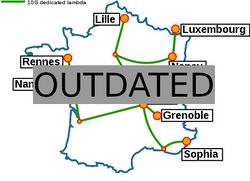Grid5000:Home
|
Grid'5000 is a large-scale and versatile testbed for experiment-driven research in all areas of computer science, with a focus on parallel and distributed computing including Cloud, HPC and Big Data. Key features:
|
Random pick of publications
Five random publications that benefited from Grid'5000 (at least 2517 overall):
- Timothee Anne, Eloise Dalin, Ivan Bergonzani, Serena Ivaldi, Jean-Baptiste Mouret. First Do Not Fall: Learning to Exploit a Wall With a Damaged Humanoid Robot. IEEE Robotics and Automation Letters, 2022, 7 (4), pp.9028-9035. 10.1109/LRA.2022.3188884. hal-03740371 view on HAL pdf
- Kadir Korkmaz, Joachim Bruneau-Queyreix, Stéphane Delbruel, Sonia Ben Mokhtar, Laurent Réveillère. In-depth analysis of the IDA-Gossip protocol. 21st IEEE International Symposium on Network Computing and Applications (NCA 2022), IEEE, Dec 2022, Boston, MA, United States. pp.139-147, 10.1109/NCA57778.2022.10013564. hal-03966190 view on HAL pdf
- Loïc Rouquette, David Gerault, Marine Minier, Christine Solnon. And Rijndael? Automatic Related-key Differential Analysis of Rijndael. AfricaCrypt 2022 - 13th International Conference on Cryptology in Africa, Jul 2022, Fes, Morocco. pp.150-175, 10.1007/978-3-031-17433-9_7. hal-03671013 view on HAL pdf
- Anna Mossolova, Kamel Smaïli. The only chance to understand: machine translation of the severely endangered low-resource languages of Eurasia. The Fifth Workshop on Technologies for Machine Translation of Low-Resource Languages (LoResMT), COLING 2022, Oct 2022, Gyeongju, South Korea. hal-03774644 view on HAL pdf
- Govind KP, Guillaume Pierre, Romain Rouvoy. Studying the Energy Consumption of Stream Processing Engines in the Cloud. IC2E 2023 - 11th IEEE International Conference on Cloud Engineering, IEEE, Sep 2023, Boston (MA), United States. pp.1-9. hal-04164074 view on HAL pdf
Latest news
Failed to load RSS feed from https://www.grid5000.fr/mediawiki/index.php?title=News&action=feed&feed=atom: Error parsing XML for RSS
Grid'5000 sites
Current funding
As from June 2008, Inria is the main contributor to Grid'5000 funding.
INRIA |
CNRS |
UniversitiesUniversité Grenoble Alpes, Grenoble INP |
Regional councilsAquitaine |


